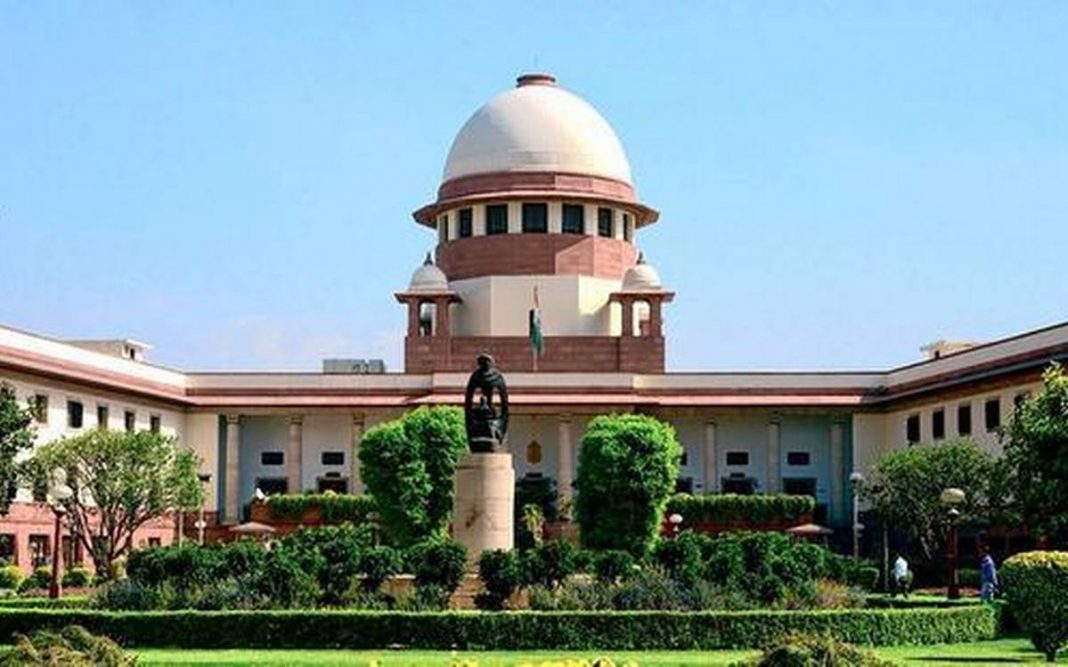The Supreme Court on Monday dismissed a plea against the use of Manipur Konung scripts in the Indian Currency notes as announced by Rajya Sabha MP Leisemba Sanajaoha, alleging that its detrimental to the original script Meetei Yelhou Mayak , which dates back to 10,000 BC.
Today, a two-judge bench of Justices Indira Banerjee and Justice JK Maheshwari have observed the present plea doesn’t disclose any cause of action and therefore dismissed it.
Under the Article 29, not every script has to be printed in the Indian currency opined Justice Indira Banerjee in response to the argument raised by Petitioner’s counsel AOR Rabin Majumder.
The petioners argued that the Govt. of Manipur has been attempting to deprive them of their right to worship, their places of worship and preserve their script in connection with the religion that they practise which is a fundamental right guaranteed to them.
Article 29 in The Constitution Of India 1949 states,
“Any section of the citizens residing in the territory of India or any part thereof having a distinct language, script or culture of its own shall have the right to conserve the same.“
The Counsel for the petitioners has further submitted that if the presently disputed script is introduced by the Manipur Government on the currency note it may cause prejudice to the Meetei community.In the interest of justice, my humble submission should be considered and notice should be issued.
The petioner requested the court to Issue appropriate Writ and/or direction/order restraining the respondent from endorsing Manipuri Konung script in the Indian currency note till the final decision of this public interest petition.
Also Read: Supreme Court denounces indefinite delay in hearing pre-arrest bail plea by High Courts
Petitioner is a registered society (The Ahan Taranithoi Haunsang Apokpa Marup)which has sought directions to the respondents (the Centre, Govt of Manipur & Assam) to register and record Meetei Yelhou Mayak original scripts under UNESCO world.
The Petitioners had approached the UNESCO to plead for the protection and preservation of the scripts, pertaining to the religion, as entities of intangible heritage, and it had been so approved by the UNESCO .UNESCO also issued a notice to protect the Meetei script.
Post UNESCO approval, the petitioners had approached the concerned State Governments of Assam, Tripura and Manipur but to no avail. Since 1947 the Meetei of Assam and Tripura are prejudiced.
The petioner contended that the Govt. of Manipur has been attempting to deprive the petitioners of their right to worship, their places of worship and preserve their script in connection the religion that they practise which is a fundamental right guaranteed to them under Art. 29 of the Constitution.
The bench sought to know, How can such an order be passed? Why should the court pass restraint order of this kind? Art 29 does not require that every script has to be printed in the Indian currency, it opined.
Also Read: Supreme Court to take up pleas related to Pegasus snooping on Friday
“You have a right to preserve your script. You conserve your script. Who is stopping you? Sorry the Writ petition doesn’t disclose any cause of action,” said Justice Banerjee while responding to the argument that the Manipur government has abolished the word Meetei and introduced Manipuri which are different from each other.
By the way of this Writ Petition the petitioner Society had sought to challenge the Governmental unconstitutional and illegal action, jeopardizing the legal and sought directions to save constitutional rights of the Petitioner Forum’s members in particular and the Citizens residing in States of Assam, Tripura, and elsewhere in India, in general.
The petitioner in this case was a religious sect/ order founded by Naoria Phulo in 1930 and an ardent follower of Apokpa Laining Religion and Cultural Heritage followed by Meeteis since time immemorial.
The Manipur Official Language Act, 1979 did not in protect the Meeteilon spoken by the outsider Meeteis. Further in 1992, Manipuri language was recognised under the 8th schedule of the Constitution. However, the State Government did not make provisions to impart Meetei Yelhou scripts to the Meeteis of Assam and Tripura. Thus, the State deprived the fundamental and bonafide birth rights of the outsider Meeteis to learn Meetei scripts and specific heritage, traditional culture, etc. guaranteed under the Constitution of India.
Also Read: Tata-Mistry case: Supreme Court agrees to hear Mistry plea against 2021 verdict
They have created social distancing between the Meeteis of Manipur, Cachar, Assam and Tripura. The meeteis of Cachar, Assam and Tripura are also not recognised as Meetei citizens. Moreover, the Meeteis of Assam and Tripura are deprived of their fundamental right to settle in Manipur. This discrimination faced by the outsider Meeteis population would destroy their indigeneous and original culture.
They also state that Meetei scripts should be corrected, rectified or amended with original Meetei Yelhou Mayek under the directions and findings of UNESCO.
They believe that is is urgent to establish research institutes about Meetei culture and heritage. They alleged that the State has illegally introduced Konung scripts by forming Meetei Committee of Manipur and intentionally excluded Meetei members of Assam and Tripura.
Petitioner stated that the one of the major reason for their grievance is that the Respondents have initiated to endorse the Manipuri Konung scripts in the Indian Currency notes.


